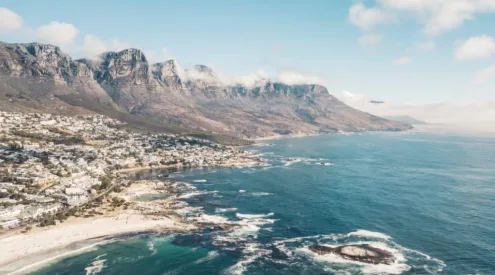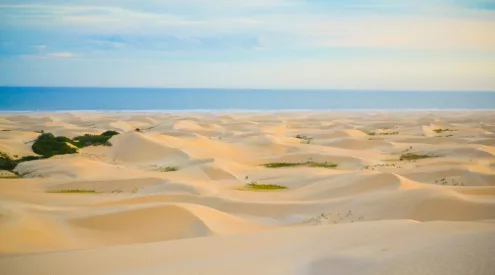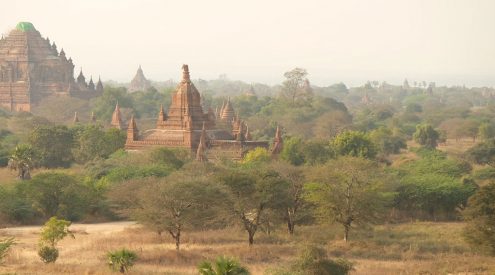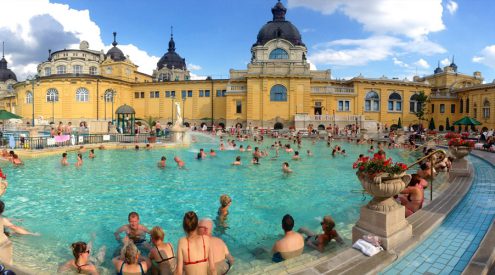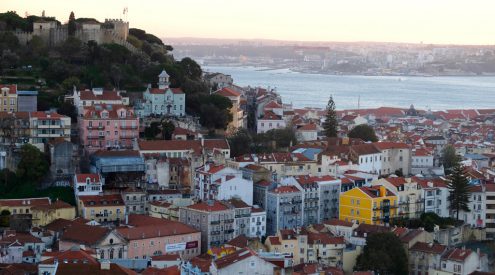I woke as we neared the Syrian border, my left cheek clammy and wrinkled. Saliva had collected on the headrest of my reclined bus seat and gone cold. I rubbed life back into rubbery skin, and looked outside. The land was drier than yesterday, when I had watched the sun set over central Turkey through the same window. Olive trees clung to brittle soil, their roots shabbily exposed. Adding theirs to other muted greens, they pushed a withered face above the ground’s gradual undulations.
At immigration, Claire and I – the only tourists on our Syrian owned bus – were treated with suspicion. A man sporting dirty fatigues and an oily black moustache examined my passport, close to his nose at first, and then, after slowly extending his arms, from a great distance. He punched something into the computer before him, eyelids narrowing over already strained eyeballs, and hailed a superior.
“France?” the superior asked.
“No,” I replied, “South Africa.” The superior gestured dismissively to his underling. The underling, his still narrowing eyes now almost completely shut, started to type, hitting the keys with undisguised frustration.
“Germany?” the superior pleaded, when this fresh attempt to persuade the computer of my nationality failed.
“No, South Africa,” I repeated slowly, exaggerating the syllables.
The underling bashed more keys.
“Where place of issue?” the superior barked, now angry.
“The Department of Home Affairs.” My voice was tinged with irritation, which disguised the beginnings of concern.
“No! Where place of issue?”
“The Department of Home Affairs.” South African passports do not actually mention a place of issue. They refer, instead, to an Authority, and mine, as my passport clearly stated, was issued under the authority of the Department of Home Affairs. But this answer was obviously unacceptable. “In Pretoria!” I added, guessing the bureaucratic difficulty.
The muscles around the underling’s eyes relaxed after a few brutal keystrokes. He wrote six cryptic letters on page one of my passport, above the president’s request that I be allowed to “pass freely without let or hindrance”, and grudgingly welcomed us into Syria.
We entered Aleppo through a cloud of slow moving traffic, past posters tied doggedly to every streetlight, beaming a “welcome” more earnest than the immigration official’s, and flat roofed, ugly homes, resembling bomb shelters. Past huge all-seeing portraits of Bashar al-Assad, the president, and his late father, Hafez, the former President for Life.
The conductor, muttering his best wishes and a few garbled directions, let us off on a busy street. We walked the first few metres on our own, but were quickly surrounded. A crowd – some adults and many children – gathered around us, speaking all at once in Arabic.
“Nejm Illahdar?” I asked. The name of our hotel produced giggles. Children, fingers hanging from their bottom lips, started to gleefully repeat my words.
“Nejm Illahdar? Hotel?” I asked again. A man wearing a knitted skullcap and long sleeved tunic pointed past us, to a dilapidated building across a chaotic intersection, it’s Arabic sign glowing a dirty green.
The room contained two far-apart single beds, a shower cubicle without a toilet, tired looking plastic sandals to be used when standing on the shower’s greasy floor, and a large, quite probably antique, wooden closet. Closed curtains, hiding a broken window pane, shut out most of Aleppo’s already dreary winter light; a single low voltage bulb was expected to compensate. We took it, assuming the room was one of the city’s cheapest, knowing, more importantly, that it was the one we had already found. The owner – who wore a shock of thinning, wiry hair with threadbare traditional clothes and smoked continuously, recklessly scattering ash over himself, the floor, the furniture and, occasionally, me – spoke English in a low but just comprehensible hum. He would also, because the hotel was mentioned in our Lonely Planet, be familiar with the requests of like tourists us.
Outside, at the intersection of the new and old cities, young boys pushed heavily laden carts between falafel stands, past bright bolts of fabric and military surplus stores. They worked casually, too young to be conscious of their labour, and we followed in their wake. Passing beneath a long stretch of gentle gothic arches, we entered Aleppo’s World Heritage listed souqs, where pedestrians battled donkeys and donkeys battled trucks. “Welcome!” hailed a barber, his razor blade steady over another man’s throat. “Salaam!” wailed a butcher, his toothless grin visible behind chunks of hanging offal – liver attached to lungs, lungs attached to heart and spongy stomach, its inside out. Deeper, past the end of natural light, we were stopped by the purveyors of cloth and trinkets.
“What country?” one asked.
“South Africa,” Claire replied.
Another grin, toothy this time. The man leant over, shuffled his wares, and produced a dagger, its curved blade atop a brass hilt. Behind that he brought up a placard.
“‘n Geskenk vir jou skoonma?” it asked. “A gift for your mother in law?” in Afrikaans. The man must have had a pile of these placards, written by every foreigner to visit his store.
Lost under the patterned high roof, we glimpsed men silently carding cotton. We gave way to manually drawn carts, carrying that cotton, and stood mesmerised, observing the clickety-clack of a large handloom. Everywhere – amongst all of the slow fading subdivisions, where men sold jewellery or underwear, underwear or soft green bars of olive oil soap – people greeted us. Some demanded we take their photo, others offered tea. All gave us a flattered, insistent welcome.
Later, using the pen a stationer had given me, with the words “Syria, South Africa: Salaam, Salaam,” I attempted to define a single of the afternoon’s sensations – Aleppo’s layers of exotic sound – in my journal:
The rustle of a veil is drowned by clicking worry beads, pushed endlessly through a palm. Both succumb to the flick and grind of a blender at a juice bar, to the Arabic grunt of an order (any possible combination of orange, mango, kiwi, pomegranate, apple, carrot, strawberry, sugar, honey, nuts, and others, beyond my tourist’s radar). The tap tap tap of a cobbler on a street corner, resoling shoes. The hiss and drip of rows of chickens, turned manually around a wood fire. The laughter of men clustered around a blaring television. The clatter of metal doors rolling closed. The imperious yells of a wrinkly old man directing oblivious traffic with his shepherd’s crook. And the hoot that punctuates all, defining each maddening crescendo.
We had entered the Orient, I decided. Turkey, the squat bridge leading to Asia, could be grasped and fathomed. But here, just over its southern border, I sensed the beginnings of an incomprehensibility. Past the debris of forgotten buildings and the battered motor vehicles – a visible absence of wealth, the most obvious change – I detected permanence and clung-to traditions, new ideas of family and the individual.
“Three hundred people call my grandmother Grandmother,” said Jassem. “And I have more than five hundred cousins.” I paused, processing this complicated generational mathematics. The Arabic definition of grandmother must be loose, or this matriarch and her progeny had the ridiculous average of seventeen children per person.
We had met Jassem in the depths of a souq. He stopped us, introduced himself, and quickly suggested we meet that evening for tea – at the citadel, which we could easily find. He spoke English well, looked about our age, was a student, and wore familiar, if slightly too formal, Western clothes. We had just as quickly agreed, and were now smoking a nargileh, drinking tea, more and more sweet black tea, near the proud mouth of a perfectly circular thirteenth century fortification. Its dull geometry and neat limestone bricks – without turrets and crenulations – looked grindingly utilitarian, almost modern, and made my imagination work harder.
Jassem was studying European languages: English, German and French. Through these languages, and a few visiting European girls, he had encountered much of the West’s history and thought; this until recently devout Muslim now reserved his tones of reverence for the likes of Descartes and Kant. He quizzed us on South Africa, which he had obviously researched after we arranged to meet, and described an urgent desire to visit the homes of the tourists he’d befriended, to share their lives as they had shared his.
But Jassem’s family, affluent nomads from the country’s east, wanted him to marry. “I am 25,” he explained, “and they have found me a wife. She is from a good family, so they will pay a good price.”
“A good price!” I choked. “How much?”
“$3000.” The transaction would obviously not be made in Syria’s erratic pound. “$1500 is normal.”
Jassem, in spite of himself, looked proud. He did not want this veiled bride. He wanted to travel, and had developed an appreciation for “strong women” – who smoked nargileh, he told us, like Claire. He did not want the bland, traditional life of his forefathers, but could not conceal his respect for the family’s hard earned status. This respect might make it difficult for him to leave home, as he planned to, and go to Europe, to work illegally, as he planned to.
“My family have told me to come home and get married. If I don’t,” Jassem paused, absently striking and restriking my lighter, “we will be finished, I must not return. And they will not pay for my studies anymore.”
“Have you told them that you want to leave Syria?” Claire asked.
“They know,” Jassem was now twisting the string on his tea bag, round and round until the paper label broke, “and they will try to stop me.” A friend in Belgium had offered to accommodate him, but even getting a tourist visa, and leaving Syria, would be difficult.
Every Syrian man is obligated to spend two years serving in the country’s military. Jassem, because he was a student, had been allowed to defer conscription. The government required only some routine paperwork; but his brother, somehow responsible for these forms, had refused to submit them this year. Jassem would be stopped at the border and forced to serve.
“It is the worst two years of your life,” he spat.
“You’ll be an officer,” I suggested, wondering how bad it could really be.
“Officer! Pah!” His lips curled back in revulsion. “I will be paid one dollar a month and get only two days leave – no weekends. It is a prison!” And, by extension, so was Syria.
Sensing our disinterest, the café’s staff, carrying hot braziers past the rickety tables, no longer replaced the small chunks of red coal at our nargileh’s top; it had long since gone cold. We slurped the last of our tea, left the protection of our table’s pale umbrella, and entered the slowly falling rain. Jassem’s light blue top darkened with every drip. We watched him recede from the light, turn, and wave.
He had helped us arrange to visit the time blackened remains of Qa’alat al Samaan the next day. This Byzantine cathedral was built to honour Saint Simeon, an extravagant monk who spent 43 years at the site, sitting atop a pillar. Initially a little over four metres, the pillar grew and grew; by the end of Simeon’s life it was exactly 40 metres long.
I had struggled to trust Jassem. He seemed on edge, shifty. Perhaps understandably, but my South African’s imagination dwelt on the worst. I thought of unlikely, but possible, incidents. He now knew where we were staying. Knew that there was a laptop, and probably money, in our room. Knew, while we were with him, that we were not in that room. He made a call, punched a number into his too fiddled with mobile phone, and I wondered.
When he offered to help us arrange a visit to Qa’alat al Samaan, I felt relieved. I could now understand his friendliness, knew why he had shown such an unselfish interest in us, and our journey. Jassem would add commission onto the taxi driver’s price; he would be happy and so, he thought, would we. But, after he had made a few enquiries, I realised Jassem was more interested in finding us a reliable driver, at a rate we could not have negotiated alone.
My suspicion must have stemmed at least partly from guilt. Jassem had less than us. He wanted to travel, but might soon be cut off from his parents, and would not, like us, have the money. I entertained these tired justifications while we walked wet-shoed through Aleppo’s now dark, empty streets, amongst its shuttered shops and battered homes. Claire clung to my hand and our pace quickened. We walked fast, without talking, until inside our hotel, where the owner waved his cigarette wildly past m, offering tea.
Continue reading Mistaking Aleppo at OldWorldWandering.com, the story of a South African couple’s overland journey from Shanghai to Cape Town.

